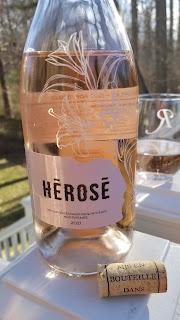IGP (Indication Géographique Protégée), is a quality category of French wine, positioned between Vin de France and Appellation d'Origine Contrôlée (AOC). The category superceded Vin de Pays in 2009. -- wine-searcher.com
 IGP Méditérranée is an IGP title that covers wine produced in a large swath of the southeast coast of France. It incorporates all of Provence, parts of the Rhône Valley such as Châteauneuf-du-Pape, and even the island of Corsica. This designation provides an alternative geographical indicator without the stringent winemaking requirements and grape variety selections imposed by the area’s multiple AOC laws.
IGP Méditérranée is an IGP title that covers wine produced in a large swath of the southeast coast of France. It incorporates all of Provence, parts of the Rhône Valley such as Châteauneuf-du-Pape, and even the island of Corsica. This designation provides an alternative geographical indicator without the stringent winemaking requirements and grape variety selections imposed by the area’s multiple AOC laws. Because of this large area, the terroir varies but is "broadly characterized by both the very southern edges of the Alps, and the warm, dry Mediterranean climate. Most vineyards can be found in the hills and valleys of the Alpine foothills as the higher altitude provides an excellent ripening situation with plentiful sunlight and cold nights. The Mistral wind from the north and sea breezes from the south often collide in spring and autumn, creating periods of heavy rainfall providing ample hydration for the vines throughout the growing season." (wine-searcher.com)
As for wine styles, IGP Méditérranée is predominately rosé, made in the typical Provençal style using. Grenache, Syrah, Carignan and Cinsaut. One such producer of this rosé is Cellier des Princes, the only cooperative winery in Châteauneuf-du-Pape. This winery was founded in 1925 and consists of 150 cooperative winegrowers located in the southern Rhône Valley. According to the winery, "they cover 580 hectares of vineyards on the exceptional terroirs of Châteauneuf-du-Pape and the surrounding communes (Sarrians, Courthézon, Orange...). The cultivation methods are inspired by those of Châteauneuf-du-Pape, so most of the Côtes du Rhône are hand-picked for optimal quality".
This week I received a sample bottle of their À l'Ombre des Parasols Hérosé - 2021 a blend of 70% Grenache, 15% Syrah and 15% Cinsault. The grapes for this "In the Shade of Parasols" were grown on mostly clay and siliceous soils and lightly pressed and fermented at low temperatures in stainless steel. Before bottling, the wine was aged an additional three months in stainless.The wine exudes perfume - a vibrant floral and citrus character that masks the strawberry and raspberries that come through on the palate. The dry character is excited by the bright acidity which carries the light flavors on a long journey.
